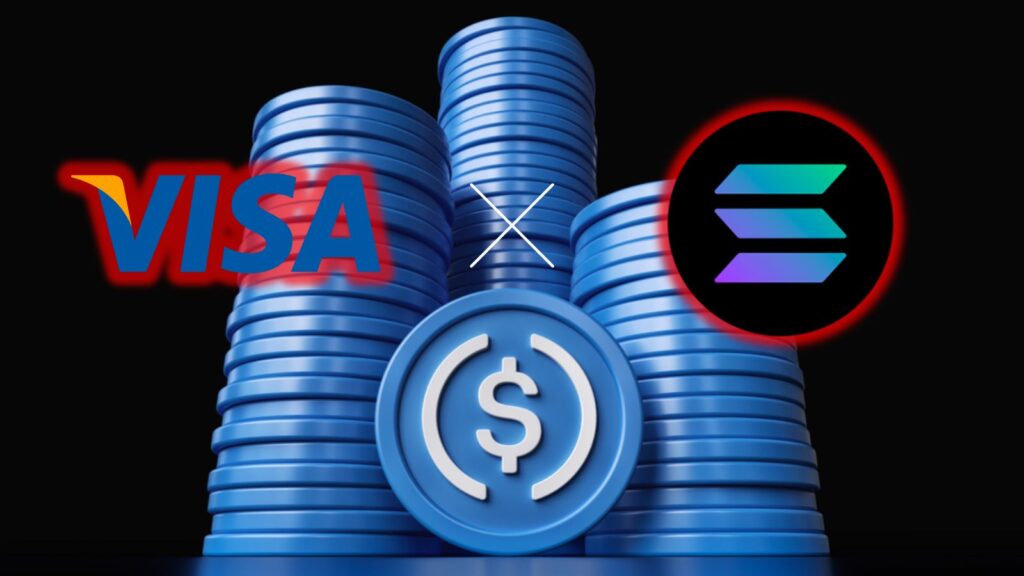
TL;DR: Visa partners with Worldpay and Nuvei to send stablecoin USDC over Solana blockchain, enabling faster merchant payments in crypto.
A Bloodless Financial Revolution
Global payments giant Visa is expanding its settlement capabilities with the addition of USD Coin (USDC) support on the Solana blockchain. Visa has partnered with merchant acquirers Worldpay and Nuvei to utilize USDC to settle payments, providing an alternative to traditional fiat settlement.
Leveraging Stablecoins and Blockchains to Improve Settlement
While credit card holders can buy goods with a mere swipe or tap, Visa facilitates a complex process behind the scenes to enable every transaction. After a purchase, the cardholder’s bank wires money to Visa’s treasury, from which Visa sends funds to the merchant’s bank.
This is usually done in fiat currency. However, Visa will now begin sending USDC out of its treasury to Worldpay and Nuvei, which can directly facilitate crypto payments for merchants. The companies chose Solana due to its faster transaction processing compared to Ethereum.
According to Visa, this pilot exemplifies how stablecoins can speed up payments and represents a modern option for cross-border money movement.
Expanding Previous Successful USDC Settlement Testing
Visa first began testing USDC settlement in 2021 through a pilot with Crypto.com. Crypto.com now uses USDC to fulfill its settlement obligations for Visa card transactions in Australia, with plans to expand this to other markets.
Previously, these cross-border Crypto.com settlements required lengthy currency conversion and international wire transfers. The USDC pilot helped reduce the time and complexity of this process.
Leveraging Solana’s Speed and Low Cost
Visa added support for Solana due to rising demand for newer, high-performance blockchains that can transfer stablecoins faster and cheaper. This makes Visa one of the first major payments firms to use Solana for live settlement.
Solana sees 400 millisecond block times and 400 transactions per second on average. It has surged to over 2000 TPS during peak demand, providing the speed and scalability Visa requires.
Continued Crypto Adoption Despite Regulatory Uncertainty
This Visa pilot comes despite ongoing regulatory action against the crypto industry. The SEC issued a Wells Notice to stablecoin issuer Paxos earlier this year. PayPal subsequently paused development of its own stablecoin.
However, PayPal still launched its stablecoin in August. Visa also stopped issuing crypto debit cards with Binance this summer amid SEC legal action. Yet this latest expansion shows Visa remains committed to crypto and stablecoins for improving payments.
Faster Settlement for Merchants and Commerce
For Worldpay and Nuvei, Visa’s USDC settlement service allows faster, more efficient settlement of consumer payments. It opens possibilities like 24/7 settlement availability and real-time processing to accelerate commerce.
As Nuvei’s CEO stated, optimizing cross-border transactions is just one use case where stablecoins can benefit online businesses globally.
The Future Looks Bright for Crypto in Payments
Despite regulatory uncertainty, major payments firms are increasingly integrating crypto into their products and services. Stablecoins like USDC enable faster settlement times, reduce costs, and provide more flexibility for merchants.
While governments may attempt to restrict financial freedom, economic forces tend to prevail. The growth of crypto in payments seems inevitable as firms recognize its advantages. The future is bright for those seeking free and open financial networks beyond the control of central planners.
Sources
- Visa press release
- Interview with Visa’s Cuy Sheffield
- Fortune article on Visa pilot
- The Block article on Crypto.com partnership
- CoinDesk article on Solana blockchain




